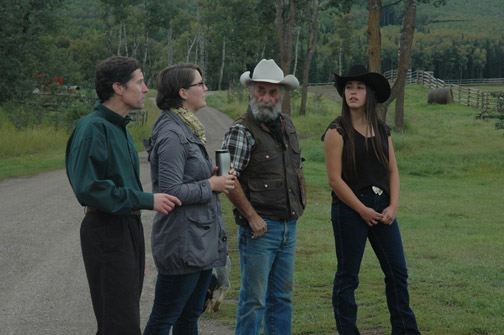A northern study will look at new crop options in an effort to broaden agricultural diversity in the region.
A University of Northern British Columbia team of researchers, led by environmental engineering professor Steve Helle, will start the project this month after it received $83,500 from the provincial and federal governments.
The research will address a number of goals: finding use for underutilized land, market diversification, youth involvement in agriculture and developing both "high value niche crops" and also ones with bioenergy potential, Helle said.
"Our main goal is actually to do the field trials," said Helle, pointing to a number of past studies that said that was the gap in knowledge.
Vanderhoof's Little Valley Farms is a project partner, offering about 6,000 acres of land that hasn't been used in 30 years, alongside Nak'azdli Whut'en First Nation's small plot of land near Fort St. James.
The first phase, kicking off this month and likely done by January 2017, will be rounding up those recommendations and a list of available infrastructure and processing facilities and the crops that will work.
That's an important aspect of the Bioenergy and Cash Crop Feasibility Study's approach, and it should mean they can hit the ground running if the research suggests suitable crops - hopefully four or five. From lavender to quinoa and gourmet garlic to ginseng, the list is already long. The two-year field trials could start launch next year.
"A, Farming equipment is very expensive and B, they're very busy so it's gotta be something to fit in with their existing operations," Helle said. "We're not looking to displace anything they do and we can't really add on a huge amount, which is why it's great to have little valley farms as a partner because they can tell us exactly what they can and can't do.
"It keeps it very practical."
The list of potential crops could include specialty plants and vegetables, medicinal and natural health products, traditional First Nations crops and those for seed, grasses and hemp. Those recommendations will be shared with farmers in the Bulkley-Nechako Regional District.
UNBC's interim vice-president of research said the work is in line with the university's efforts around sustainable communities.
"This is an important step in assessing the changing landscape of agricultural activity in the face of climate change," said Geoff Payne in a statement. "Communities will be active partners, a hallmark of research at UNBC. The lessons learned can have significant impacts regionally and be shared to enhance northern agriculture more broadly."
Diversification is important for the north, Helle said, and looking into bioenergy offers another - perhaps more stable - option.
"Markets go up and down. If you rely overly on one market, you're going to have good years and bad years and if you can have additional crop, that might help smooth things out," he said.
"(Vanderhoof wants) to explore the possibility of a district heat system that is supplied with residue from their fields. It gives the farmers one more market and it's going to be a fairly stable market, everyone always needs heat and energy."
The average B.C. farmer is 56 years old, which is higher than all other provinces, a report to Prince George city council in May said. B.C. also has the lowest percentage of farmers under 25 years of age in Canada.
While Little Valley farm is most focussed on youth and creating a viable farming future, the Nak'azdli Whut'en, which also funded the project, has emphasized the need for food security, Helle said.
"They are doing a lot of work already with their youth around food security, fishing and traditional crops and this project will hopefully feed in with the work they're doing, expand what they're doing in greenhouses and fishing to outdoor agriculture," Helle said.
"Nak'azdli Whut'en sees the need for economic diversification and welcomes this opportunity to partner on this project," said Coun. Fred Sam in a statement. "Looking ahead, we anticipate this study will springboard new opportunities for the community and region."


.png;w=120;h=80;mode=crop)
